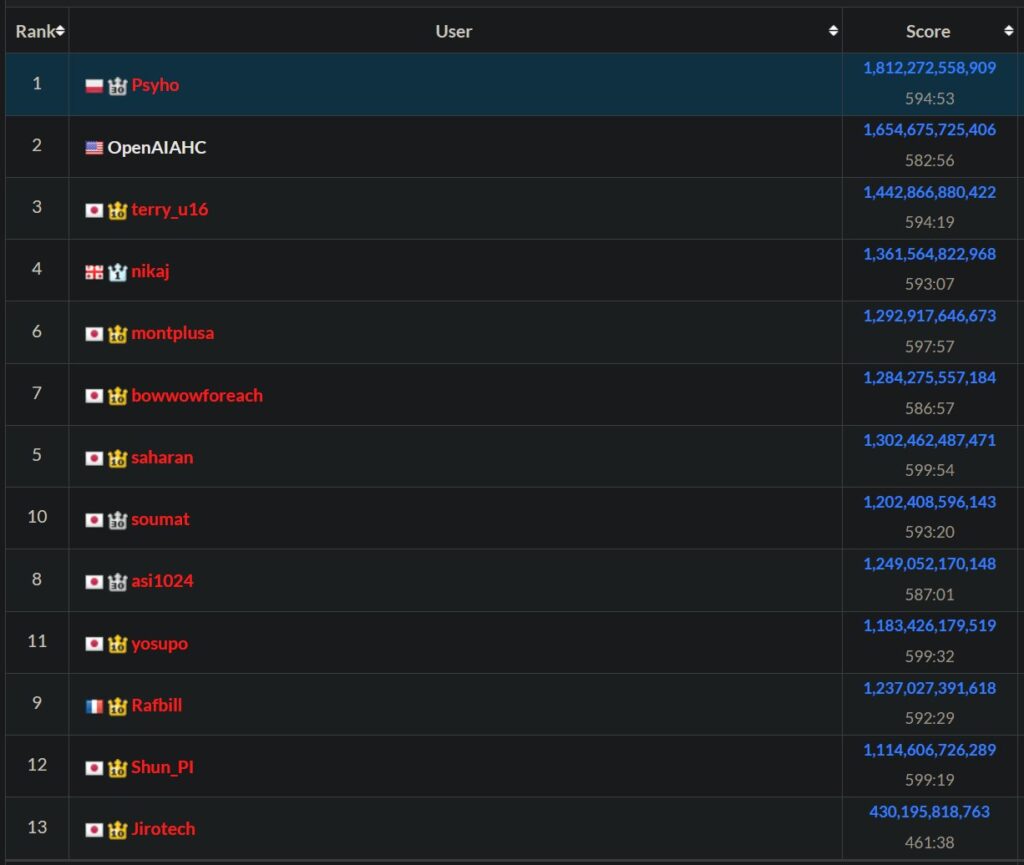A Polish coder recently achieved something remarkable: he beat a sophisticated AI model from OpenAI in a direct coding competition. After a grueling 10-hour marathon, he described himself as “completely exhausted.”
On Wednesday, Przemysław Dębiak, who goes by “Psyho” and used to work at OpenAI, managed to narrowly win against the custom AI model during the AtCoder World Tour Finals 2025 Heuristic contest held in Tokyo.

This event marked a significant moment as it featured one of the first instances where an AI model faced off against top human coders in a major global competition.
AtCoder, a Japanese platform known for its competitive programming events, also included a special exhibition match called “Humans vs AI,” sponsored by the creators of ChatGPT. Despite their best efforts, the AI team ended up in second place.
Dębiak shared on X that “humanity has prevailed (for now!),” while admitting he was running on very little sleep after competing in multiple events over three days. He expressed how drained he felt, saying, “I’m completely exhausted. … I’m barely alive.”
The competition involved tackling a single complex optimization problem over a span of 600 minutes. This contest draws a parallel to the American folk hero John Henry, who famously raced against a steam-powered drill in the 1870s.

Just as Henry’s story highlighted a human’s struggle against machines, Dębiak’s win showcases a coder pushing his limits to demonstrate that human talent still holds value in the era of advanced AI.
Both narratives feature intense endurance challenges—Henry hammered steel spikes until he collapsed, while Dębiak coded for ten hours with hardly any rest.
The bittersweet nature of their victories is similar: Henry triumphed but paid the ultimate price, symbolizing the relentless advance of machines, while Dębiak’s statement that humanity has won “for now” hints at his awareness that this victory might only be temporary against the rise of ever-more capable AI.
Dębiak not only claimed a prize of 500,000 yen but also managed to endure his challenge better than the legendary steel driver.
The AtCoder World Tour Finals pushed both human and AI participants to their limits, presenting complex optimization problems that have no perfect answers; instead, there are only solutions that are slightly better than the last.
What’s the purpose of this coding competition?
The AtCoder World Tour Finals is one of the most prestigious events in competitive programming, featuring only the top 12 coders from around the globe. These programmers are selected based on their performance over the past year.
The competition’s Heuristic division deals with “NP-hard” optimization problems. In this context, heuristics refer to strategies that help find satisfactory solutions quickly, using shortcuts and educated guesses when finding the perfect answer would take too long.
To ensure fairness, all participants, including those from OpenAI, used the same hardware provided by AtCoder. This setup created an equal opportunity for both human and AI competitors.
The rules of the contest allowed contestants to choose any programming language available on the AtCoder platform. There were no penalties for resubmitting solutions, but participants had to wait five minutes between each submission.
The results from the contest revealed that Psyho scored an impressive 1,812,272,558,909 points, while OpenAI’s model, referred to as “OpenAIAHC,” achieved 1,654,675,725,406 points. This means Psyho won by a margin of about 9.5 percent.
OpenAI’s AI, designed for simulated reasoning and similar to the o3 model, finished in second place, outperforming ten other human programmers who had earned their spots through a year-long ranking process.
OpenAI hailed this second-place finish as a significant achievement for AI in the competitive programming landscape.
A representative from the company noted in an email that while models like o3 are often ranked in the top 100 for coding and math contests, this was the first time an AI secured a top-three position in a major event.
They emphasized that competitions like AtCoder allow them to evaluate how well their models can think strategically, plan for the future, and refine solutions through trial and error, much like humans do.
The rise of AI in coding tasks is undeniable. Although OpenAI’s optimistic view of the contest results may seem broad, many AI models have significantly enhanced their coding abilities in recent years.
For instance, the 2025 AI Index Report from Stanford University indicated that on the SWE-bench, a benchmark for coding skills, AI systems could only solve 4.4% of coding problems in 2023, but this number soared to 71.7% in 2024.
Coding is a primary function for chatbots from companies like OpenAI, Anthropic, Google, and Meta. Tools like GitHub Copilot and Cursor have become essential for many developers.
A 2024 survey by GitHub revealed that over 90% of developers now incorporate AI coding tools into their workflows, although a recent study suggested that these tools might not save as much time as developers expect.
Despite the advancements in AI coding capabilities, Dębiak’s victory feels more like a key moment in an ongoing journey rather than a final win.
Unlike the story of John Henry, who lost his life after his victory, Dębiak has the opportunity to continue coding. However, he might face an even more advanced machine in future competitions.
Dębiak expressed his surprise at the attention surrounding the event, stating on X, “Honestly, the hype feels kind of bizarre. Never expected so many people would be interested in programming contests.”
For now, the unique human skill of discovering unexpected solutions sets coders apart. However, as OpenAI and other organizations keep improving their models, future participants in AtCoder may find themselves working alongside AI rather than competing against it—or perhaps not at all.
Other Stories You May Like
